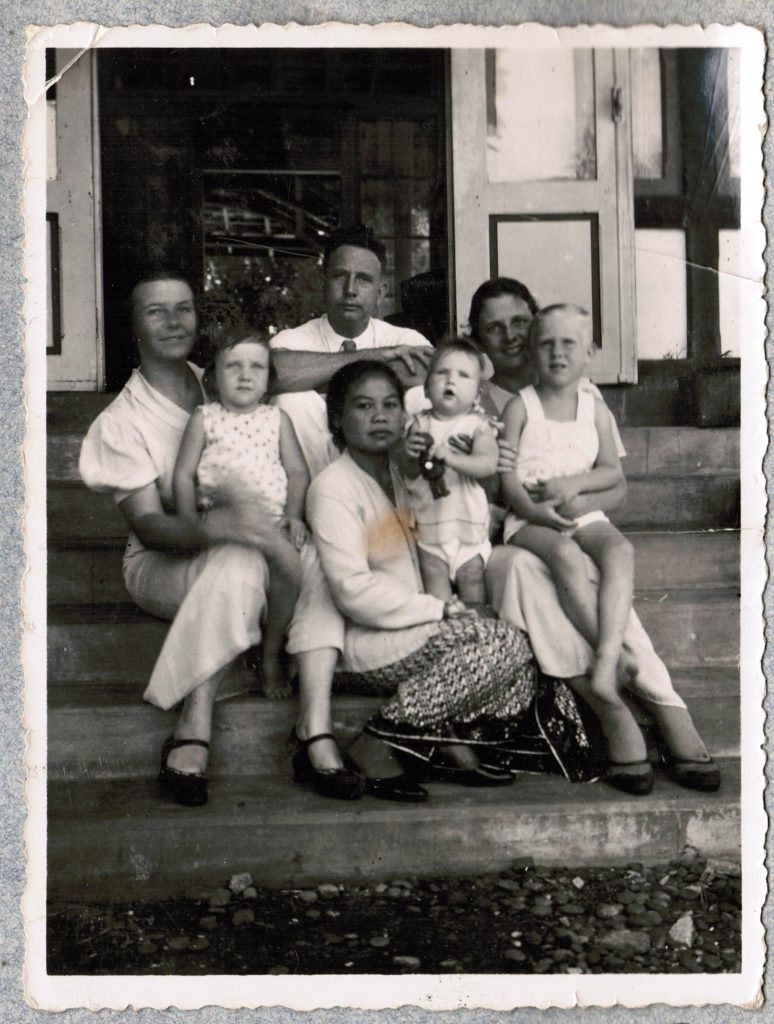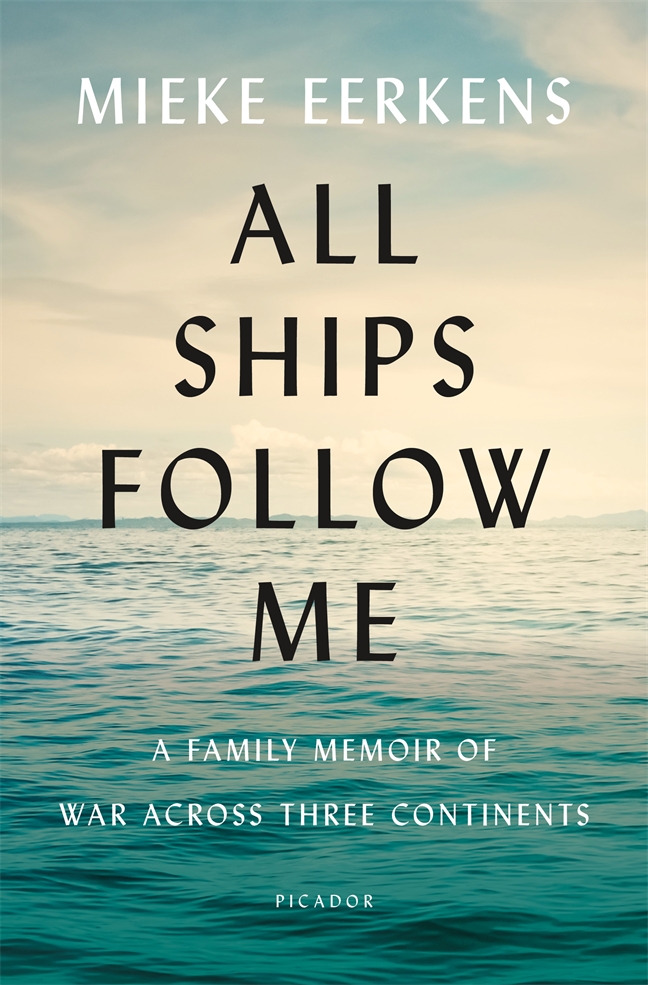WCAG Heading
by Mieke Eerkens
Internment Camp Lampersari, Semarang, Dutch East Indies, December 28, 1942
Authority in Lampersari is established immediately. As they enter the camp, some women are pulled from the line and their suitcases opened to be searched for contraband: money, Dutch or English printed material, radios, and more. Sjeffie, now eleven years old, watches wide-eyed as the Japanese officers hit mothers with their batons to make them move when they get off the trucks. They shout orders in a language none of the prisoners understand, and when these orders aren’t followed, the flat ends of their sabers come down hard on whomever they happen to reach, sometimes splitting flesh and drawing blood. It’s a new violence for most of these children, and a cacophony of cries adds to the chaos. Luckily, Sjeffie’s mother is toward the back of the group of arriving prisoners and escapes injury, though later in the year she will not be so lucky, and her children will have to watch her being beaten to the ground because she doesn’t notice an officer approaching and therefore fails to bow to him in time.
Sjeffie and his mother
and little sisters and brother are assigned to a small house on the Hoofd
Manggaweg, the Main Mango Road. There
are already three families living in the two- bedroom house when they arrive,
and they shrink themselves into the corners, hanging a sheet up for privacy.
Soon more women and children arrive, truckload after truckload, and Sjeffie and his family contract their spaces repeatedly,
compressing more tightly with each new
family until there are thirty people living in the house, crammed into every square inch. Children sleep in drawers, on and under tables,
piled in sweaty heaps in the tropical heat. Snoring bodies lie shoulder to
shoulder on mats on the floor. One toilet without running water serves all
thirty of them in the house, and it soon overflows with human waste. They try
to fend off malaria by hanging up klamboes
over their sleeping bodies, a necessity in the Indonesian tropics, so that
the house at night fills with ethereal clouds of hazy mosquito netting from
wall to wall. My grandmother keeps a secret diary in the camp, penciled onto
onionskin paper hidden in the pages of her Bible. She addresses her entries to
my grandfather throughout her internment:
I am sleeping with the boys in what was once a kitchen
. . . On February 2 the first group arrived [of the 2,000 new internees] .
. . 860 people. Until this point, they had been housed in
nice, large homes where they had taken care of themselves. There was a lot of hustling and the empty
places streamed full…Tomorrow we’ll get another 250 from Soerabaya.

Almost immediately after
they arrive in Lampersari, Aunt Ko begins covertly teaching Sjeffie, his
siblings, and other boys and girls in the camp from contraband Dutch language
textbooks she has smuggled in. Every
day, she sets up a little schoolroom in the tiny kampong house while the others clear out and stand watch in case an
officer passes and hears them. Sjeffie gets to practice his numbers again. He
gets to read, sucking up the words, reading the same books again and again. In
one of the houses across the road, he and some other boys have set up a little
hidden library under the thatched roof, where they collect their books— Jules
Verne’s Twenty Thousand Leagues Under the
Sea, Hector Malot’s Nobody’s Boy,
Cervantes’s Don Quixote, and other
books with wide appeal to young boys. Most of the children or their parents
have brought pencils and notepads, but very quickly they realize how scarce
these things are. “Sjeffie, make sure you write small. Save room on your
paper,” Aunt Ko says sternly during class. Aunt Ko is very strict. She’s a
religious woman who does not approve of waste or idleness. Sometimes she draws
on the dirt floor with a stick so she doesn’t have to waste paper or pencil.
Meals during the first
month in the camp are meager but sufficient. The prisoners get small portions,
mostly of rice but also of some vegetables and meat in the beginning. The meat
lasts only a short time. The vegetables last longer, but they too dwindle after
several months. After that, all meals
consist of a cup of rice or tapioca porridge twice a day, sometimes once a day.
Sjeffie lines up with his mother and siblings with all the other prisoners,
holding their tin cups. When they get to the front of the line, their cups are
filled from giant pots that the kitchen workers have cooked the rice or
porridge in. One mea sured portion per person. Being assigned to work in the
kitchen is a coveted job because there are chances to tuck food under one’s
shirt, swipe a finger inside the rim of the pot when the officers look away, or
sneak a second helping.
Lampersari is one of the
first camps in Indonesia to be targeted for the infamous “comfort women,” the women
specifically selected to be raped by the Japanese officers. A recruiter is sent
to Lampersari for this task. However, the women hear the rumor about what is
about to happen and gather en masse to fight back. They block access and fight
fiercely to protect the young mothers and teenage daughters whom the Japanese
officers prey upon, forcing the Japanese to abandon Lampersari as a suitable
source for comfort women, not worth the trouble after repeated violent beatings
only seem to strengthen the prisoners’ resolve to fight back. The Japanese have
set up two hundred internment camps throughout the Dutch East Indies, and
prisoners at the smaller camps are easier to overpower.

The officers who guard
them inside the camp quickly get Dutch nicknames. The officers include John the
Whacker; Little Ko; Hockey Stick; Pretty Karl; the Bloodhound; the Easter Egg;
Bucket Man; Chubby Baby; and Dick and Jane, who patrol together. Seikon Kimura,
the man known as John the Whacker, is arguably the most sadistic. He earns his
nickname for the way he seems to enjoy striking internees indiscriminately,
without warning. When he discovers that a woman in the camp has been hiding
money, he confiscates it and punches her in the face. He kicks her in the back until
she is unable to stand while her children scream. He has her carried to the
center of the camp, where he makes her lay injured in the equatorial sun from
morning until evening without water. After the war, the Allied war crimes
tribunal will sentence him to death for his human rights violations during the
war. He is convicted of “carry ing out a systematic reign of terror,” with
witnesses at his trial describing his beating of a woman with a piece of wood until
her arms broke in several places for sitting down during her work, causing a
woman to go permanently deaf after being beaten for thirty minutes for
smuggling cigarettes, forcing prisoners to stand in stress positions,
withholding water and food, and whipping children until their flesh was in
tatters, among other atrocities. Hockey Stick earns his name from the wooden
hockey stick he carries with him throughout the camp and uses to take the legs
out from under a prisoner. Then he makes them stand up so he can do it again,
over and over, laughing every time. The Bloodhound is more selective, but he is
capable of beating people into a coma when he does lose his temper.
In September 1944,
the Japanese officers announce that the boys on the hill will be transferred out of Lampersari and
tell the mothers to say goodbye to their
sons, those scab- kneed, lizard-
catching children now considered mature
enough to do hard labor in a separate
camp. The phrase the Japanese use is “men over ten.” As in, “All of the men
over ten are hereby reassigned to new camps.” And so with a change of one word,
with a relabeling, they justify the transfer.
The women clutch at their
sons and weep. They whisper words into their ears as they hug them goodbye,
hasty insufficient summaries of all the things that they would have taught them
in the remaining years of childhoods that now have to be condensed into a few
minutes. Sjeffie’s mother tries to remember things to tell him. Wash whenever you can, check for lice and
ticks, find a buddy and work as a team, don’t fight, keep practicing your
equations, whatever you do just don’t do
anything to anger the officers, that’s very important, OK, you have to promise
me, can you promise me that? Aunt Ko says, “Say your prayers every day.”
Sjeffie’s little sister Doortje hugs him and gives him some coffee. Fien, his
youngest sister, hugs his legs, and my father kisses the top of his baby brother
Kees’s head. Through the agitated buzz of the Dutch mothers, camp officers
shout angry words in Japanese, words like iikagennishiro
and teiryuu and shuutai and hikihanasu, words that tumble into one another and mean nothing to
the women until the guards start whacking them with their batons and whips,
pulling son from mother and mother from son like starfish from wet rock. Then
the boys are marched out of Camp Lampersari as their mothers wail and their
younger siblings watch wide- eyed. The cries of Mammie, Mammie rise repeatedly from their midst as they pass
through the camp gates, heads swiveling for their last looks back. The newly branded
“men” march with their little suitcases banging against their knobby knees for
what Sjeffie believes is many hours, along the banana trees and the warungs and the kopi carts. A rumor spreads in low tones through the group as they
walk. “I heard they’re taking us to Bangkok.” “Yep, they definitely said they’re
taking us to Bangkok. I heard the Jap say it.” “Psst, hey, word is we’re going
to Bangkok.” “Bangkok! That’s not even in the Indies! I won’t ever see my family
again!” “Well, that’s where we’re going. Bangkok.”
Within what is in all
likelihood less than one hour, they arrive at the front g ate of a convent, and
the officers leading them stop. This is Camp Bangkong, their new home.
Excerpted from All
Ships Follow Me: A Family Memoir of War Across Three Continents.
Copyright © 2019 by Mieke Eerkens. Published by Picador USA. All rights
reserved.
